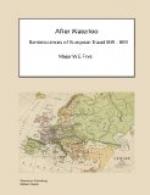Before we arrived at Borgo San Donino we crossed the Trebbia, one of the many tributary streams of the Po, and which is famous for two celebrated battles, one in ancient, the other in modern tunes (and probably many others which I do not recollect); but here it was that Hannibal gained his second victory over the Romans; and here, in 1799, the Russians under Souvoroff defeated the French under Macdonald after an obstinate and sanguinary conflict; but they could not prevent Macdonald from effecting his junction with Massena, to hinder which was Souvoroff’s object. In fact, in this country, to what reflections doth every spot of ground we pass, over, give rise! Every field, every river has been the theatre of some battle or other memorable event either in ancient or modern times.
Quis gurges aut quae flumina lugubris
Ignara belli?[81]
We started from Borgo San Donino next morning; about ten miles further on the right hand side of the road stands an ancient Gothic fortress called Castel Guelfo. Between this place and Parma there is a very troublesome river to pass called the Taro, which at times is nearly dry and at other times, so deep as to render it hazardous for a carriage to pass, and it is at all times requisite to send on a man to ford and sound it before a carriage passes. This river fills a variety of separate beds, as it meanders very much, and it extends to such a breadth in its debordements, as to render it impossible to construct a bridge long enough to be of any use.
This, however, being the dry season, we passed it without difficulty. Two or three other streams on this route, seguaci del Po, are crossed in the same manner.
The road to Parma, after passing the Taro, lies nearly in a right line and is bordered with poplars. If I am not mistaken, it was somewhere in this neighbourhood that the Carthaginians under Hannibal suffered a great loss in elephants, who died from cold, being incamped during the winter. I am told there is not a colder country in Europe than Lombardy during the winter season, which arises no doubt from its vicinity to the Alps.
Opulence seems to prevail in all the villages in the vicinity of Parma, and an immense quantity of cattle is seen grazing in the meadows on each side of the road. The female peasantry wear the Spanish costume and are remarkably well dressed.
We arrived at Parma at twelve o’clock and stopped there three hours.
PARMA.
After a hasty breakfast, Mr G— and myself sallied forth to see what was possible during the time we stopped in this city, leaving the Captain, who refused to accompany us, to smoke his pipe. This city is very large and there is a very fine Piazza. The streets are broad, the buildings handsome and imposing, and there is a general appearance of opulence. We first proceeded to visit the celebrated amphitheatre,




